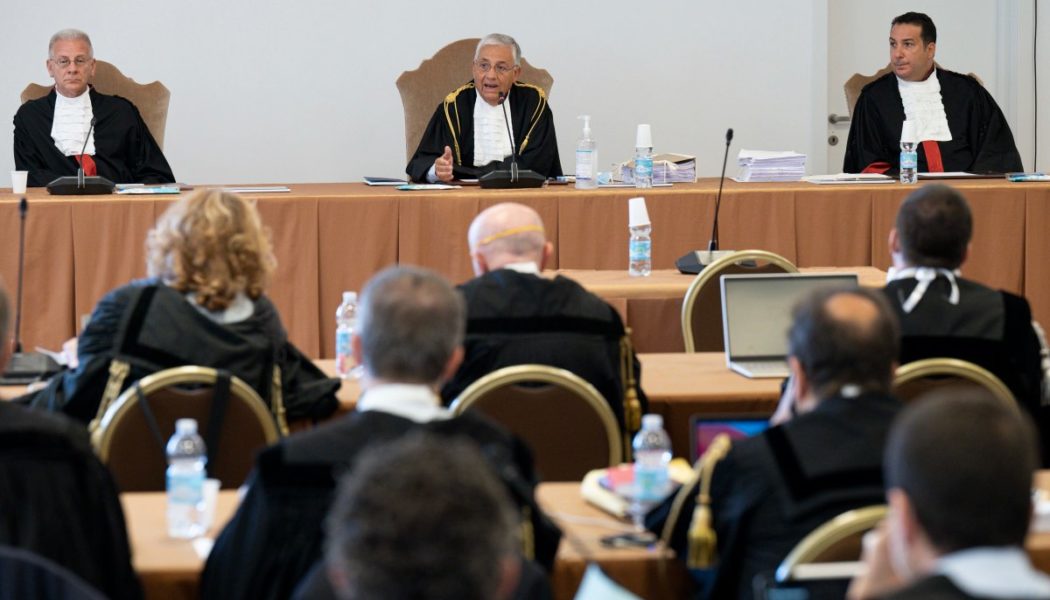
ROME – It’s probably fair to say that over the centuries, the pope’s criminal justice system hasn’t exactly enjoyed a sterling reputation.
Nineteenth century French novelist and journalist Edmond About, whose 1859 book The Roman Question remains arguably the single best treatment of the papal court, wrote that in the unlikely event you were ever to see a Church official being prosecuted by a Vatican court, “Rest assured the public interest has no part in the business. The real springs of action are to be sought elsewhere.”
Most observers probably would have said something similarly cynical about Vatican justice, albeit less elegantly, as late as last week. On the limited number of occasions when the Vatican tribunal now handles a case of consequence, the working assumption has been that it convicts who it’s supposed to convict and acquits who it’s supposed to acquit – i.e., that its role is to rubberstamp decisions made elsewhere, while lending them a veneer of legal respectability.
Yesterday, however, that perceived rubber stamp showed some spine.
Under presiding Judge Giuseppe Pignatone, former Chief Magistrate of Rome, the court issued rulings in two separate cases, each of which required some measure of resolve. Both represented an act of defiance against two entities which traditionally have wielded considerable influence over criminal cases here – in the first case, the Vatican’s prosecutor’s office, and in the second, the more ephemeral court of public opinion.
The first ruling came in the Vatican’s “trial of the century,” a blockbuster case involving ten defendants, including the very first cardinal to face such an indictment, and centering on a $400 million London property deal gone horribly wrong.
The indictment presented by the Promoter of Justice, in effect the D.A. of the Vatican system, relies heavily on the testimony of a turncoat witness, Italian Monsignor Alberto Perlasca, the former director of the financial affairs office within the Secretariat of State. Perlasca was arguably the architect of the London deal, heading what his own boss in a written declaration for the court called a “rotten and predatory system” within the Secretariat of State, but he managed to escape indictment himself by turning on his erstwhile colleagues.
Unlike other witnesses, prosecutors videotaped Perlasca’s testimony, but they didn’t include those recordings in the materials submitted to the court and defense lawyers. During a hearing in July, the tribunal ordered them to turn over those recordings by Aug. 10, but the prosecutors balked citing the need to protect the privacy of those involved.
On Monday those same prosecutors asked the court to allow them to recollect all the evidence in the case, a time-consuming endeavor which presumably would have allowed them to interview Perlasca again and submit only that material, ensuring the tapes never surfaced.
Yesterday, the tribunal in effect replied, “Not so fast.”
While the judges approved the withdrawal and eventual resubmission of some charges, they allowed others to stand. Most importantly, the court ruled the prosecutors can’t have it both ways. They can’t rely on the Perlasca recordings to bring legal charges against someone – which, by definition, is a public act – and then refuse to turn over the recordings on the basis of privacy concerns.
Once again, the tribunal ordered the prosecutors to cough up the tapes, this time with a deadline of Nov. 3.
Tuesday’s second ruling came in the case of a former pre-seminarian named Gabrielle Martinelli, now a priest in the Italian diocese of Como, who’d been charged with sexual abuse of another pre-seminarian in a facility which, at the time, was located on Vatican grounds. The rector at the time, Monsignor Enrico Radice, was also charged with knowing about the abuse but covering it up.
Granted, the legal case was complex from the outset, involving charges that one minor abused another. The accuser also gave shifting, and sometimes conflicting, versions of events. From a PR point of view, however, the narrative was fairly simple: A Vatican court has the chance to show it takes abuse seriously.
Bear in mind, too, that the verdict came less than 24 hours after the release of a massively damning report on clerical sexual abuse in France, creating a swell of negative coverage around the world and stoking new questions about whether claims of reform are for real.
In the end, the judges absolved the two defendants. Technically, they were acquitted on some charges, on others they were held to be “not punishable” because they represented exceptions to the crime charged, and in still other instances their alleged crimes were judged to be past the statute of limitations.
The bottom line, however, is that nobody was convicted and nobody’s going to jail.
Of course, that decision presumably was reached well before anyone knew the French report would be coming out at the same time, but it was entirely predictable that there might be some PR blowback anyway. No matter when it happens, if you have a choice between two headlines – “Vatican convicts priests for abuse” and “Vatican acquits priests on sex abuse charges” – it doesn’t take a PhD in communications theory to figure out which one is likely to play better.
Naturally, one can argue the merits of either ruling.
Maybe the prosecutors have good reasons for not wanting to turn over the Perlasca tapes – though if they do, they’ve been remarkably discrete about telling anyone what those reasons are. Maybe Martinelli and Radice really did deserve some sort of censure in the sex abuse case, even if it was hard to determine based on the trial record.
What’s not disputable, however, is that reaching both decisions required the tribunal to show some gumption. If nothing else, that may suggest that as the London trial continues to play out, we have more surprises in store.
Follow John Allen on Twitter: @JohnLAllenJr
Join Our Telegram Group : Salvation & Prosperity









